
Decree Passed In Eviction Suit Against One Of Joint Tenants Binding On All Others: Rajasthan High Court
 |
|The Rajasthan High Court observed that a decree passed in an eviction suit against one of joint tenants shall be binding on all other tenants.
One of the Tenants had filed a suit challenging the decree of eviction. The High Court dismissed an Appeal challenging the dismissal of the Tenant’s suit.
The Bench of Justice Rekha Borana observed, “Once it is held that the tenancy was joint, a notice to one of the joint tenants is sufficient and further, even the suit against one of the tenants would be good. Further, a decree passed in such a suit shall also be binding on all the tenants”.
Senior Advocate R.K. Thanvi appeared for the Appellant (Moolchand and his legal representatives) and Advocate Saurabh Maheshwari appeared for the Respondents (Lilaram and the landlord).
In 1968, two shops were let out to Moolchand and Lilaram jointly. During a suit for eviction filed against both, Lilaram claimed he was the sole tenant and Moolchand was not involved. Moolchand's name was subsequently deleted from the suit with his consent. A decree for eviction was passed against Lilaram in 2001.
Moolchand filed a suit in 2005 to declare the decree null and void, claiming he was a tenant and was not impleaded in the earlier suit. Both the Trial Court and the First Appellate Court dismissed Moolchand's suit. Aggrieved, Moolchand's legal representatives approached the High Court by way of a second appeal challenging the dismissal of his suit seeking a declaration that the decree was null and void.
The Appellants contended that Moolchand was a tenant and should have been impleaded in the earlier suit. Therefore, the decree was not binding on him. However, the Respondents argued that Moolchand abandoned his tenancy and consented to the deletion of his name.
The Court noted that an application under Order XLI Rule 27, Civil Procedure Code, 1908 (CPC) was filed by the Lilaram in the appeal, seeking to include seven documents on record. These documents include five orders/judgments from Civil Courts in previous proceedings related to the same disputed property. Annex.-R/1/1 is a copy of the application under Order I Rule 10 and Section 151 of the CPC filed by landlords in an earlier suit for deleting the name of the Appellant. Annex.-R/1/7 is a copy of the undertaking filed by Lilaram/Respondent before the Trial Court in compliance with the judgment passed by this Court in a previous second appeal.
The Court observed that all these documents are relevant to earlier proceedings involving the same parties and the same disputed property. Five of them are orders/judgments from Civil Courts, and the other two are not disputed. Since pleadings regarding these documents have been made in the present suit, including them in the record would facilitate the prompt and effective adjudication of the current dispute. Therefore, the application under Order XLI Rule 27, CPC was granted, and the documents attached to the application are permitted to be taken on record.
The Court, after a thorough examination, observed no grounds to interfere with the impugned judgment and decree. The Court observed that Moolchand never claimed to have paid rent to the landlord, and there was no evidence supporting such a payment. The legal representatives of Moolchand failed to establish they were conducting business with him in the rented premises. Additionally, The Court noted that, if Moolchand is considered a joint tenant, then is bound by the 2001 decree. The Court held that, Moolchand had waived/surrendered any tenancy rights and that the adverse inference from their absence in the witness box was justified. The power of attorney holder for Moolchand was also deemed unable to testify on matters known only to the principal. The Court held that Moolchand and his representatives were bound by the 2001 decree.
Accordingly, the Court dismissed the Appeal.
Cause Title: Manoj v Kailashchandra (2023:RJ-JD:44092)